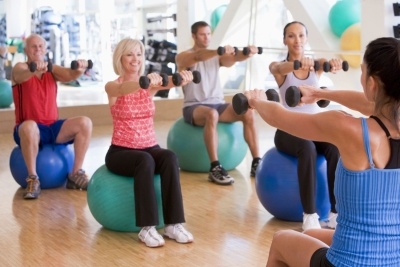Our clients who suffer from chronic conditions often also suffer from depression and anxiety. This can be alleviated with small group exercise classes.
Clients who suffer from chronic illness also have increased levels of stress. Stress leads to lack of sleep, which can increase levels of depression and anxiety. Winter can also create mild or moderate depression. Indeed severe winter depression, known as seasonal affective disorder (SAD), is marked by depressed mood, sleeping more than usual, increased appetite, cravings for sweets and carbohydrates, and weight gain. While light therapy can help, it is often hard to be able to get outside. This is particularly true with clients who are also suffering from chronic illness.
Exercise is the best stress-reducer around, and is one of the best reasons for us to encourage clients to stay active. In fact, it is not unusual to reduce the use of anti-depressants and anti-anxiety medication (under medical supervision) after participating in an exercise program.
I have found that one of the best ways to help this population is to create a well-designed small group exercise class. Depression and anxiety in those with medical issues can be reduced through exercise, especially if performed in a small group format. The social component of exercise can decrease depression. In our world of social media, texts, and emails, the social aspect of exercise cannot be overlooked. Often, it can be the only part of the day where our clients have a human connection.
Small group classes are fun, motivating, social, and cost effective. The social aspect of fitness can help your client maintain a fitness routine especially if an exercise group is created with clients who have similar conditions. This group becomes a comfortable space filled with friendly supportive participants acting as a support group. The support group aspect is especially important for your clients with chronic conditions. Each group reinforces each other and motivates your client to stick with it and ultimately increase his or her physical activity level and improve their health. Some of my clients in the past used any excuse to avoid any type of physical activity. Now they are motivated to exercise by the friendships they developed in the class.
A small group exercise class can also be educational. It will enable you to keep everyone up to date on the latest research on health and exercise. Your clients will look forward to attending their session due to the group format. A fun, small group exercise class can transform a participant from couch potato to fitness enthusiast.
Springtime is right around the corner…how can we use that to help our clients? Include your ideas in the comments section for other methods to avoid SAD?




